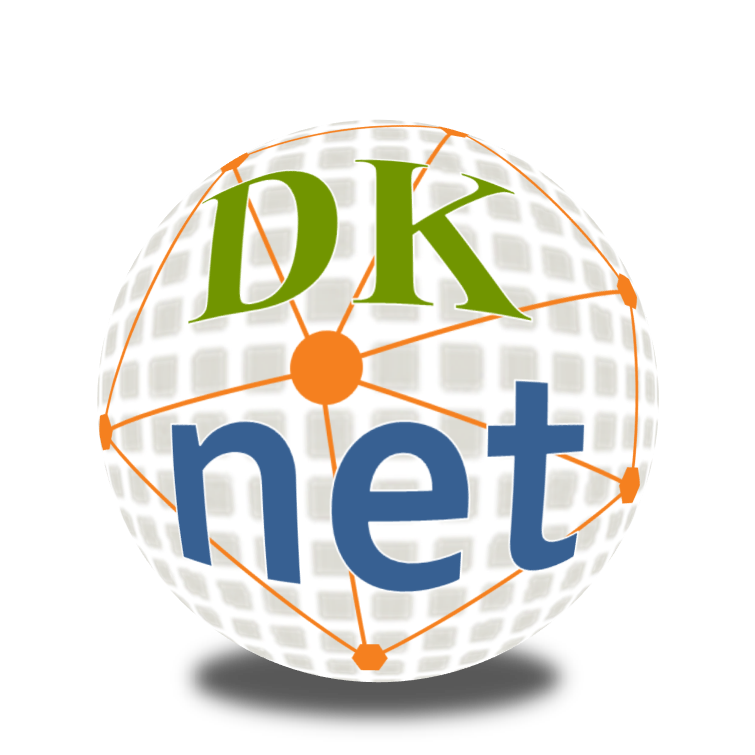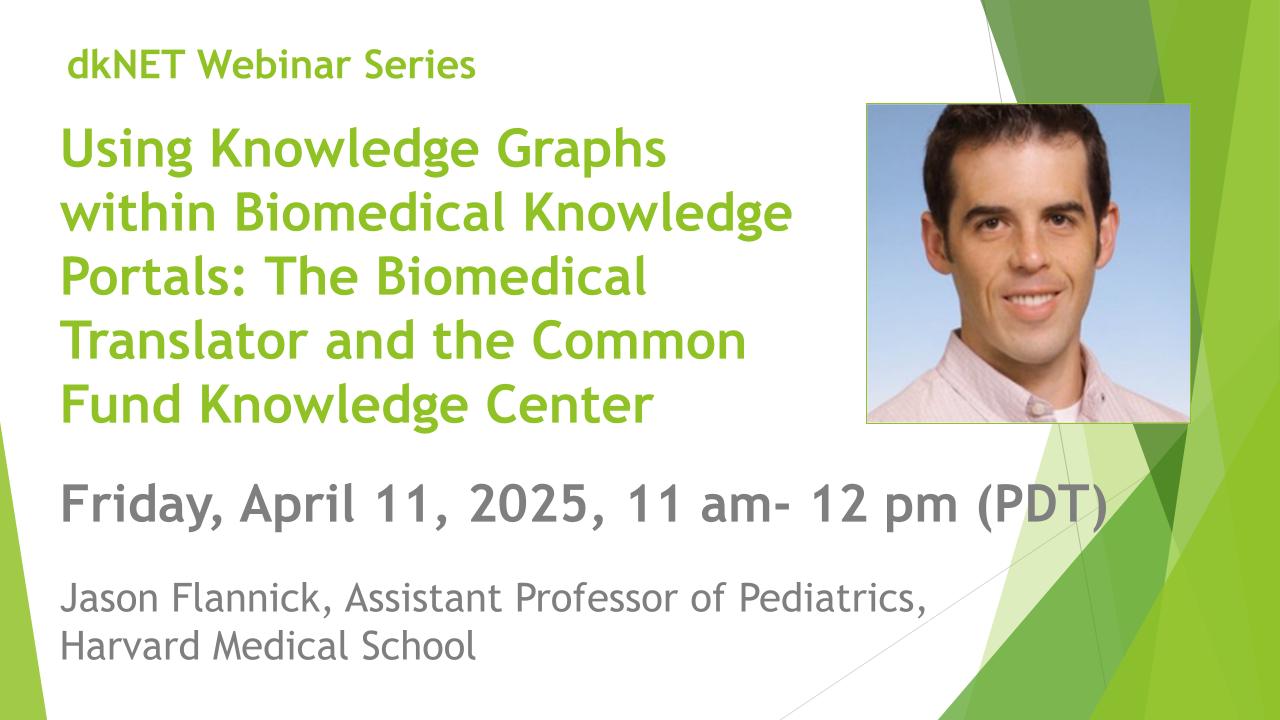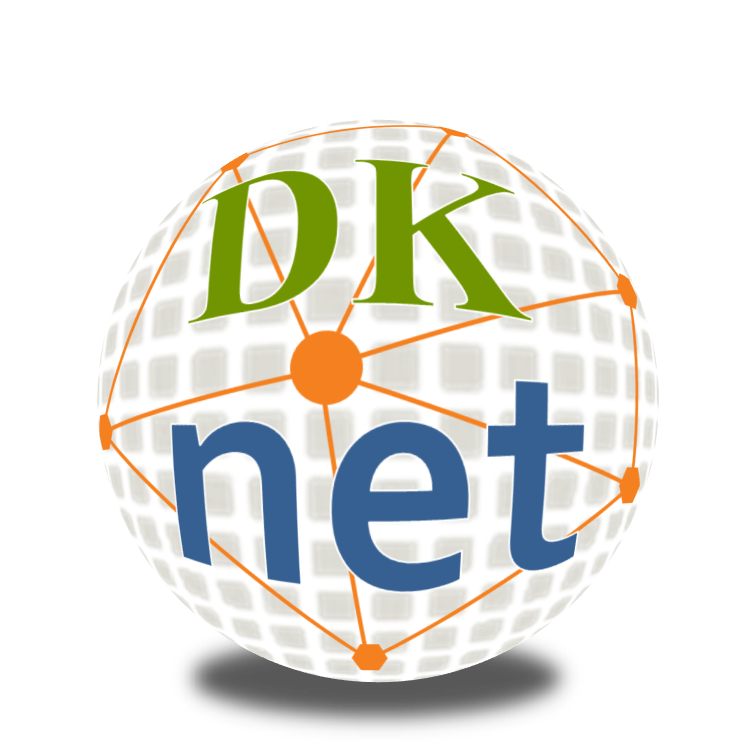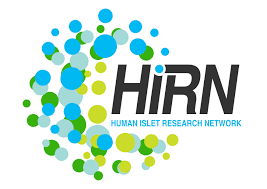dkNET community events and announcements in January, 2021
- 09:08pm January 5, 2021
- Ko-Wei Lin
Dear dkNET Community,
dkNET provides updates on activities of interest to the NIDDK-supported community. You could keep up to date on these activities through our Twitter feed @dkNET_info, through our Community Calendar, or through dkNET e-mail list. If you have an event or funding opportunities you'd like to advertise, please contact us info_at_dknet.org.
dkNET News
- dkNET Webinar Series
- Upcoming webinar: Save the date! Join dkNET's next webinar "FAIR Data & Software in the Research Life Cycle" presented by Christopher Erdmann who is an engagement, support, and training expert on the NHLBI BioData Catalyst project at the University of North Carolina Renaissance Computing Institute, on Friday, Jan. 22, 2021, 11 am - 12 pm PST. Abstract and dial-in information: https://dknet.org/about/webinar
- Funding Opportunity - dkNET New Investigator Pilot Program in Bioinformatics
- 2021 dkNET Summer of Data Student Internship To support researchers with the use of on-line resources, the 6-week dkNET Summer of Data Student Internship program provides students an opportunity to utilize the dkNET tools and resources in a research project and to provide feedback on their experience to the dkNET team. Students will learn best practices to enhance rigor and reproducibility and learn the basics of good data management by following the FAIR (Findable, Accessible, Interoperable, Reusable) data principles. dkNET will award a $1,000 scholarship to a limited number of high school, undergraduate or graduate (Masters or PhD) students who are working in a research lab during summer 2021. Awards will be determined by a competitive selection process. Application due date: Apr. 9, 2021.
- Join dkNET Team! We're looking for a Community Liaison/ Outreach Coordinator! dkNET has an open position for a Community Liaison to provide community outreach and lead engagement with the scientific community. This position will support a range of activities linked to community-dkNET partnerships, researcher engagement and knowledge networking. Apply it now and come join our team!
Events in January, 2021
Jan. 05, 2021
NIH Virtual Workshop on Technologies, Phenotyping, and Data Science for Animal Models
The Office of Research Infrastructure Programs (ORIP) invites you to register and attend a virtual workshop on Technologies, Phenotyping, and Data Science for Animal Models. The focus of this workshop series will be on identifying obstacles, technology and resource gaps, and new approaches for assessing the value and limitations of animal models used to address basic science questions and/or to study human diseases. More information: https://www.scgcorp.com/validationseries2021/Agenda
Workshop Registration Deadline: Precision Nutrition: Research Gaps and Opportunities Workshop
The science of precision nutrition is a holistic approach to developing comprehensive and dynamic nutrition recommendations relevant to both individual and population health. It is a framework in research and practice that considers multiple, synergistic levels of influence: dietary habits, genetic background, health status, microbiome, metabolism, food environment, physical activity, socioeconomics, psychosocial characteristics, and environmental exposures.
NIH/KOMP workshop on Gene Essentiality and Fetal Precision Medicine
This workshop will explore how best to combine IMPC and human sequencing resources for fetal precision medicine and to further our understanding of the intolerome and, at the opposite end of the spectrum, apparently dispensable genes identified in consanginous populations. More information: https://dknet.org/about/dknetnews/2167
Jan. 07, 2021
Abstract Submission Deadline: Experimental Biology 2021
Experimental Biology will be held in a virtual format from April 27-30, 2021. This means that you and your colleagues will have many new and exciting opportunities for scientific discovery without travel. Our new virtual meeting will bring you the latest research in anatomy, biochemistry, molecular biology, investigative pathology, pharmacology and physiology through an environment that fosters interaction amongst global attendees. More information: https://experimentalbiology.org/
Jan. 11-12, 2021
NIDDK Workshop: Precision Nutrition: Research Gaps and opportunities Workshop
A primary goal of the field of precision nutrition is to optimize metabolic response in individuals or population subgroups through tailored dietary approaches to promote health and prevent and treat disease. Many factors, including all levels of influence mentioned above, affect individuals’ physiologic responses to diet. Precision nutrition science enables individualized dietary recommendations or therapies based on these factors. This workshop will bring together scientists with diverse expertise to explore how best to address these complex factors. It also will focus on diet-related chronic diseases and how artificial intelligence (AI) and deep-learning techniques may be used to generate individualized dietary recommendations and algorithms. Opportunities for research and training of the next generation of future researchers in the field of precision nutrition will be discussed. Registration deadline: January 5, 2021.More information: https://www.niddk.nih.gov/news/meetings-workshops/2021/precision-nutrition-workshop
Jan. 12, 2021
NIH Virtual Workshop on Vertical Integration Approach for Preclinical Research
The Office of Research Infrastructure Programs (ORIP) invites you to register and attend a virtual workshop on Vertical Integration Approach for Preclinical Research. The focus of this workshop series will be on identifying obstacles, technology and resource gaps, and new approaches for assessing the value and limitations of animal models used to address basic science questions and/or to study human diseases. More information: https://www.scgcorp.com/validationseries2021/Agenda
Jan. 13, 2021
Diabetes Research Centers Virtual Seminar Series: Social Determinants of Health and Diabetes: Focusing a Newer Lens
Racial/ethnic and socioeconomic disparities in diabetes are longstanding and well-documented. While past diabetes disparities research has often highlighted individual-level interventions and behavioral targets to improve disparities, the social determinants of health (SDOH) represent systemic and root cause factors responsible for inequities at the level of populations. Dr. Hill-Briggs will present findings from the ADA's current SDOH and Diabetes Scientific Review, including nomenclatures for understanding SDOH, evidence of SDOF impact in diabetes, available recommendations for action to mitigate the SDOH, and recommendations for the next generation of diabetes research on SDOH. More information: https://dknet.org/about/dknetnews/2170
NIH Virtual Workshop on Summary Report and Discussion of Sessions I to IX
The Office of Research Infrastructure Programs (ORIP) invites you to register and attend a virtual workshop on Summary Report and Discussion of Sessions I to IX. The focus of this workshop series will be on identifying obstacles, technology and resource gaps, and new approaches for assessing the value and limitations of animal models used to address basic science questions and/or to study human diseases. More information: https://www.scgcorp.com/validationseries2021/Agenda
Jan. 19, 2021
Abstract Submission and Financial Aid Application Deadline: Diabetes: Keystone Symposia - Many Faces of the Disease
This program will include lectures on atypical forms of T1D, as well as the emerging premise that beta cell dysfunction contributes to progression of this autoimmune disease. A dedicated session for T2D will highlight disease variations and challenge the current dogma associated with genetic and environmental differences between individuals. This conference is being held jointly with Obesity: From Cell to Patient. The program contains joint sessions, workshops, and even a joint Keynote speaker. The joint sessions will highlight the contribution of obesity to T2D pathogenesis, with an emphasis on novel areas of research, including the role of different types and sources of fat, exosome signaling and the role of the microbiome. Overall, this conference strives to raise awareness in the clinical and basic research communities about the need to sub-stratify diabetes to develop better treatment options. More information: https://virtual.keystonesymposia.org/ks/live/698/page/6258/?_ga=2.254338763.2121227955.1603951269-810827375.1596582099
Jan. 19, 2021
Abstract Submission and Financial Aid Application Deadline: Keystone Symposia - Obesity: From Cell to Patient
Obesity is a chronic disease affecting millions of people world-wide, and is often associated with numerous co-morbidities, including Type II diabetes, liver disease and cardiovascular disease. This conference aims to gather the world leaders in obesity research and discuss numerous topics- from the cell to the patient- as they relate to obesity. Obesity is an annual topic for Keystone Symposia and is considered to be one of the most critical in the field and the previous Keystone Symposia conferences have been heavily focused on basic research. Therefore, this conference program particularly aims to address this gap by providing a greater balance with clinical/translational research on the program. Additionally, there are sessions that have a special focus on the gut/brain axis, including the microbiota, as there is emerging research in this area that has made transformational steps in our understanding of etiology of this disease, as well as in treatment. Moreover, there is strong evidence that the gut/brain axis is important not just for appetitive behavior but also energy homeostasis, blood glucose and even emotional state. Finally, this conference is being held jointly with the annual diabetes conference, Diabetes: Many Faces of the Disease, as there is obvious overlap in these fields. Therefore, the program will contain joint sessions and even a joint Keynote speaker. With this pairing, it is anticipated to draw the leaders in this field from around the world, as well as the next generation of future scientists. Connecting scientists in basic, transitional, clinical and pharmaceutical research will be crucial to moving the field forward.
dkNET Webinar: FAIR Data & Software In The Research Life Cycle
Good data stewardship is the cornerstone of knowledge, discovery, and innovation in research. The FAIR Data Principles address data creators, stewards, software engineers, publishers, and others to promote maximum use of research data. The principles can be used as a framework for fostering and extending research data services. This talk will provide an overview of the FAIR principles and the drivers behind their development by a broad community of international stakeholders. We will explore a range of topics related to putting FAIR data into practice, including how and where data can be described, stored, and made discoverable (e.g., data repositories, metadata); methods for identifying and citing data; interoperability of (meta)data; best-practice examples; and tips for enabling data reuse (e.g., data licensing). Practical examples of how FAIR is applied will be provided along the way. Presenter: Christopher Erdmann, Engagement, support, and training expert on the NHLBI BioData Catalyst project at University of North Carolina Renaissance Computing Institute. More information: https://uchealth.zoom.us/meeting/register/tZYtcOmpqDssGtbrgWmXVJ-xfINVH6M1Ml_d
Lipid Maps Webinar: The role of sphingolipids in rare and common diseases
Presented by: Professor Frances Platt.
Funding opportunities information and deadlines in January, 2021
Jan. 05, 2021
NIDDK Notice of Special Interest First Available Due Date: Kidney Precision Medicine – Technology Development and Translation
This NOSI intends to encourage small businesses to translate kidney precision medicine discoveries and technologies. Recent gains in access to kidney tissue and bio-samples and advances in multi-scale interrogation of human tissue and single cells have set the stage for precision medicine to be applied to kidney disease. Specifically, several cohort studies have included kidney biopsies [e.g., the Kidney Precision Medicine Project (KPMP) and the Nephrotic Syndrome Study Network (NEPTUNE)], and research consortia have advanced novel tools and technologies to interrogate bio-samples and released multi-omic data to the public. These bio-samples, technology, and data offer opportunities for technology development and translational research in the area of kidney precision medicine. Proposed technologies are expected to support efforts in kidney precision medicine. Projects must be within the mission of the NIDDK. More Information: https://grants.nih.gov/grants/guide/notice-files/not-dk-21-007.html
NIDDK Funding Opportunity Application Due Date: NIDDK Catalyst Award (DP1 Clinical Trial Not Allowed)
The NIDDK Catalyst Award is designed to complement NIDDK's traditional, investigator-initiated grant programs by supporting individual scientists who propose pioneering and transformational studies in topic areas of interest to NIDDK's Division of Diabetes, Endocrinology and Metabolic Diseases, and to NIDDK's Division of Digestive Diseases and Nutrition. Applications should be focused on major scientific challenges, and have the potential to produce an unusually high impact on diseases and conditions that are central to the mission of these two divisions within NIDDK. To be considered responsive to this initiative, the proposed research should reflect new and novel scientific directions that are distinct from concepts and approaches being pursued in the investigator’s research program or elsewhere. More information: https://grants.nih.gov/grants/guide/rfa-files/RFA-DK-20-024.html
NIDDK Funding Opportunity: GenitoUrinary Development Molecular Anatomy Project (GUDMAP) - Atlas Projects (U01 Clinical Trial Not Allowed) Letter of Intent Due
This Funding Opportunity Announcement (FOA) requests applications for GUDMAP Atlas Projects to generate data for the GUDMAP database. The scope of Atlas Projects is limited to molecular and anatomical development of human and mouse (1) lower urinary tract, including ureters, bladder, urethra, prostate, and external male genitalia; and (2) kidney and lower urinary tract vasculature, nerves, and lymphatics. The GUDMAP Atlas Projects will be part of the GUDMAP consortium which was established to generate a molecular anatomy atlas of the developing mouse and human kidney and lower urinary tract. The GUDMAP consortium is expected to be a continuing resource for the research community and its long-term objective is to establish a comprehensive understanding of kidney and lower urinary tract development and maturation to inform the study of tissue maturation and aging, organ dysgenesis and disease, and ultimately organ repair and regeneration.
NIDDK Funding Opportunity Letter of Intent Due Date: Reconfiguration of GenitoUrinary Development Molecular Anatomy Project (GUDMAP) /(Re)Building A Kidney (RBK) Data Hub (U24 Clinical Trial Not Allowed)
This Funding Opportunity Announcement invites applications for a consolidated Data Hub for the GenitoUrinary Development Molecular Anatomy Project (GUDMAP) and the (Re)Building a Kidney (RBK) consortium.The GUDMAP/RBK Data Hub will have both scientific and administrative responsibilities, including the operation of a searchable web-based data repository. The Data Hub will implement FAIR (Findable, Accessible, Interoperable, and Reusable) principles and have appropriate domain expertise, such as in bioinformatics, website and software development, biocuration and ontology development (including specific expertise in appropriate organ anatomy and physiology), and workshop planning and administration. The Data Hub will also oversee an Opportunity Pool Program that will allow the consortium to proactively adapt to a changing scientific landscape and identify gaps within the RBK and GUDMAP consortia. NIDDK Funding Opportunity Application Due Date: Stephen I. Katz Early Stage Investigator Research Project Grant (R01 Clinical Trial Not Allowed)
The Stephen I. Katz Early Stage Investigator Research Project Grant supports an innovative project that represents a change in research direction for an early stage investigator (ESI) and for which no preliminary data exist. Applications submitted to this Funding Opportunity Announcement (FOA) must not include preliminary data. Applications must include a separate attachment describing the change in research direction. The proposed project must be related to the programmatic interests of one or more of the participating NIH Institutes and Centers (ICs) based on their scientific missions.This Funding Opportunity Announcement does not accept applications proposing clinical trials.
NIDDK Funding Opportunity Application Due Date: NIDDK Education Program Grants (R25 Clinical Trial Not Allowed)
The NIH Research Education Program (R25) supports research education activities in the mission areas of the NIH. The overarching goal of this R25 program is to support educational activities that complement and/or enhance the training of a workforce to meet the nation’s biomedical, behavioral and clinical research needs.To accomplish the stated over-arching goal, this FOA will support creative educational activities with a primary focus on: Courses for Skills Development; Research Experiences. These courses for skill development and research experiences must fall within NIDDK's mission areas. NIDDK supports research training skill development and research experiences on diabetes and other endocrine and metabolic diseases; digestive diseases, nutritional disorders, and obesity; and kidney, urologic, and hematologic diseases.





